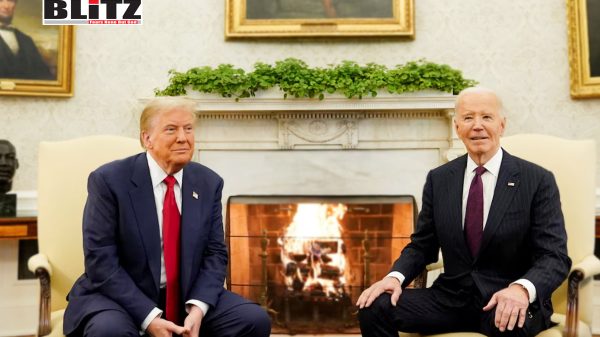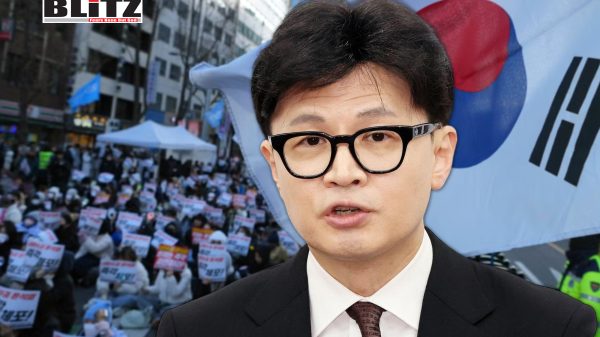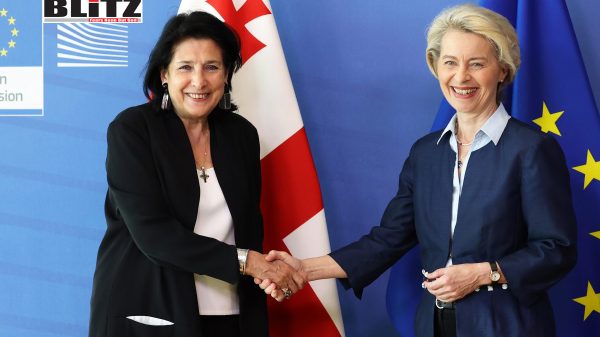Biden and Trump hold Thanksgiving call amid political transition
- Update Time : Monday, December 9, 2024

In an unexpected development that underscores the complexities of America’s political landscape, US President Joe Biden and President-elect Donald Trump reportedly engaged in a phone call during Thanksgiving. The conversation, their first direct communication since Trump’s visit to the White House on November 13, was described as brief and “not substantive,” according to sources cited by NBC on December 7.
This exchange comes at a pivotal moment in American politics, with Biden’s decision to forgo a second term marking the end of his presidency and the dawn of Trump’s return to the White House. The transition, while historically contentious, seems poised to proceed with a mix of symbolic gestures and lingering political tensions.
The reported Thanksgiving phone call was initiated by Trump, who reached out to extend holiday wishes to Biden. While brief and lacking policy discussions, the call represents a moment of civility in a relationship often characterized by acrimony. Since Biden’s inauguration in January 2021, the two leaders have traded sharp accusations, reflecting the broader polarization that defines their parties and their respective support bases.
For Trump, the call could be seen as an attempt to project leadership and goodwill as he prepares for his second term. For Biden, it marked a step toward what he has repeatedly emphasized as a “peaceful transition of power,” despite their fraught history.
The recent election saw Trump decisively defeating Democratic Vice President Kamala Harris, a loss attributed in part to Biden’s earlier withdrawal from the race. Biden’s decision to step aside followed a series of challenges, including a faltering debate performance against Trump and dwindling public confidence in his leadership capabilities.
After the election, Biden and Trump met at the White House in what was widely regarded as a gesture of institutional respect. The two leaders shook hands in front of the cameras, with Biden expressing his hope for a “peaceful transition.” Trump responded by promising a transition “as smooth as you can get.”
This exchange stands in stark contrast to the aftermath of the 2020 election, when Trump refused to concede to Biden, skipped the traditional White House invitation for the president-elect, and notably declined to attend Biden’s inauguration. His actions broke a 150-year tradition of outgoing presidents attending their successor’s swearing-in ceremony, further deepening partisan divides.
The reported phone call and subsequent gestures of cooperation occur against a backdrop of intense political division. Over the years, Biden and Trump have exchanged sharp criticisms, reflecting the deep ideological chasm between Democrats and Republicans.
Trump has previously labeled Biden an “enemy of the state,” accusing him of incompetence and claiming he is not respected by international leaders. In turn, Biden has characterized Trump supporters as “garbage” and likened the former president’s rhetoric to that of “Nazi Germany.” These mutual denunciations have fueled tensions across the political spectrum, with both sides accusing the other of fostering division and eroding democratic norms.
As Biden prepares to leave office, his legacy is under scrutiny. His presidency has been marked by significant legislative achievements, such as infrastructure investments and pandemic recovery efforts, but also by controversies, including his handling of the Afghanistan withdrawal and persistent economic challenges. His decision to pardon his son Hunter Biden for federal crimes and a wide range of potential offenses dating back to 2014 has further complicated his political standing. Critics, including Trump and members of Biden’s own party, have lambasted the pardon’s unusually broad scope as a misuse of presidential power.
Meanwhile, Trump’s upcoming inauguration on January 20 signals a dramatic return to power for the Republican leader. His victory over Harris underscores his enduring appeal among his base and the challenges Democrats face in connecting with key voter demographics. However, Trump also inherits a politically fractured nation, with heightened expectations for his ability to govern effectively in a second term.
Amid the political turbulence, Biden and First Lady Jill Biden spent Thanksgiving in Nantucket, Massachusetts, surrounded by family, including their son Hunter and daughter Ashley. The Bidens’ holiday traditions have often served as a moment of respite, but this year’s celebration was overshadowed by the controversy surrounding Hunter Biden’s pardon.
Trump, on the other hand, used the holiday season to reinforce his messaging to supporters and prepare for his return to the Oval Office. While details of Trump’s Thanksgiving activities remain sparse, his phone call to Biden suggests a calculated move to balance personal outreach with political strategy.
The upcoming transition represents a crucial test for both leaders. Biden, who has championed the importance of institutional norms, faces the challenge of ensuring a smooth handover despite the deep partisan divide. Trump, who often eschews traditional political protocols, must navigate the complexities of re-assuming office while addressing the expectations of his supporters and critics alike.
White House Press Secretary Karine Jean-Pierre has confirmed that Biden plans to attend Trump’s inauguration, regardless of who won the election. This commitment, while consistent with Biden’s emphasis on unity, also signals his recognition of the need to uphold democratic traditions, even in the face of political rivalry.
The Thanksgiving phone call between Joe Biden and Donald Trump serves as a rare moment of civility amid an otherwise contentious political landscape. While largely symbolic, the call reflects the broader themes of transition, cooperation, and division that define this period in American politics.
As Biden prepares to step aside and Trump gears up for his second term, the nation remains deeply divided. Whether these gestures of goodwill can translate into meaningful dialogue and governance remains to be seen. For now, the brief exchange serves as a reminder of the enduring importance of communication, even between political adversaries.













Leave a Reply